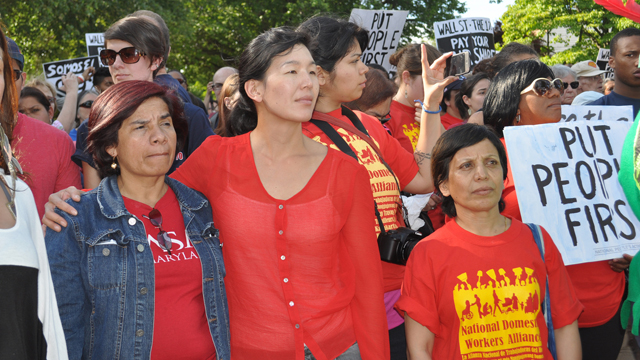
Ai-jen Poo with members of the National Domestic Workers Alliance at a rally in Washington, DC. (Photo Credit: Bekah Mandell)
Like farmworkers, most of America’s 2.5 million domestic workers — nannies, housekeepers and caregivers — are not covered by federal wage, overtime, organizing and other labor laws. Many toil 12 to 15 hours per day and are paid less than $200 a week. So, it was a major milestone when New York state passed the Domestic Workers Bill of Rights in 2010. At least 200,000 domestic employees, mostly immigrants, are now entitled to a 40-hour workweek with overtime pay, one day of rest per week and three days of paid time off after a year of employment. The law protects them against sexual harassment and entitles them to temporary disability benefits and unemployment insurance.
This unprecedented victory came after a five-year organizing campaign led by Domestic Workers United (DWU) and one of its founders, 38-year-old Ai-jen Poo. The daughter of immigrants, Poo points out that domestic workers “do the work that makes all other work possible.” After graduating from Columbia University and working as a community organizer, Poo helped start DWU in 2000, assisting thousands in getting back pay and challenging other abuses. In 2007 she helped found the National Domestic Workers Alliance, which has grown into a network of groups in 19 cities and 11 states. Thanks to this organizing work, California passed its own Domestic Workers Bill of Rights earlier this year.
Poo’s work parallels the organizing of women such as Rose Schneiderman, who helped immigrant women working in early 20th-century garment sweatshops organize to improve conditions, challenge corporate priorities and build alliances with middle-class reformers such as Eleanor Roosevelt and Frances Perkins.
| « Previous: Kandi Mosset |

